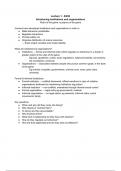Lecture 1 - 04/04
Introducing institutions and organisations
Rules of the game vs players of the game
Humans have developed institutions and organisations in order to
● Make behaviour predictable
● Regulate interactions
● Provide safety net
● Organise distribution of scarce resources
→ these shape societies and create stability
What are institutions & organisations?
● Institutions → formal and informal rules which regulate our behaviour to a lesser or
greater extent ie the rules of the game
- Eg laws, guidelines, codes, exam regulations, heteronormativity, conventions,
the constitution, protocols
● Organisations → associates between people who pursue common goals, ie the team
of the game
- Eg schools, hospitals, governments, criminal court, army, sport clubs,
university
Formal & informal institutions
● Formal institution → codified framework, official sanctions in case of violation,
organisations dedicated to maintaining institutions (eg police)
● Informal institution → non-codified, maintained through informal social control
● Formal organisation → legal entity eg governments, markets
● Informal organisation → no legal status, eg networks, informal clubs, social
movements, family
Key questions
● When and why did they come into being?
● Who directs or controls them?
● To whom are they accountable?
● Who finances them?
● What kind of relationship do they have with citizens?
● How do they regulate our behaviour?
● How are they legitimised and are they seen as effective?
, Lecture 2 - 6/4
Scott’s three pillars of institutions
Regulative / normative / cultural-cognitive ideal-type
Assumptions scott institution theory
● No situations or interactions exists in which no institutions are at stake → as soon as
there is 2 ppl in a room together, some kind of institution
● Without inst: radical uncertainty
● Inst are relatively resistant to change, provide ‘solidity’ across time and space
- Institutions are about limiting behaviour in terms of laws and rules, but can also
enable things: institutions are restricting and enabling at the same time
- eg: one-way traffic, left/right driving (provide stability)
Classic, alternative explanations of stability
● Karl Marx: stability should be seen in the light of class struggle; ownership of means
of productions and material interests creates stability, as long elite position is
secured, they have interest of keeping this way and there is stability
● Durkheim: organic solidarity, dependency on each other makes society stable;
collective sentiments, symbols, rituals
● Critical theory: culture industry, consumer society, so into consumerism and
passiveness that we don’t protest anymore
Scott defining institutions:
‘’Institutions comprise regulative, normative and cultural-cognitive elements that together
with associated activities and resources, provide stability and meaning to social life.’’
Regulative Normative Cultural-cognitive
Which institution? (Codified) laws, (Non-codified) Conventions,
rules, regulations norms and values routines,
categorisations,
scripts, formats
What is it complied Self-interest, Social obligation, Taken-for-
with? cost-benefit binding grantedness, shared
deliberations expectations, sense understanding
of appropriateness
How is it enforced? Formal sanctions Social sanctions Enforcement is not
(eg fines, necessary
punishments),
monitoring,
surveillance
How strongly is it Weak Medium Strong
internalised?
Affect Fear, Shame/honour, Certainty/confusion





